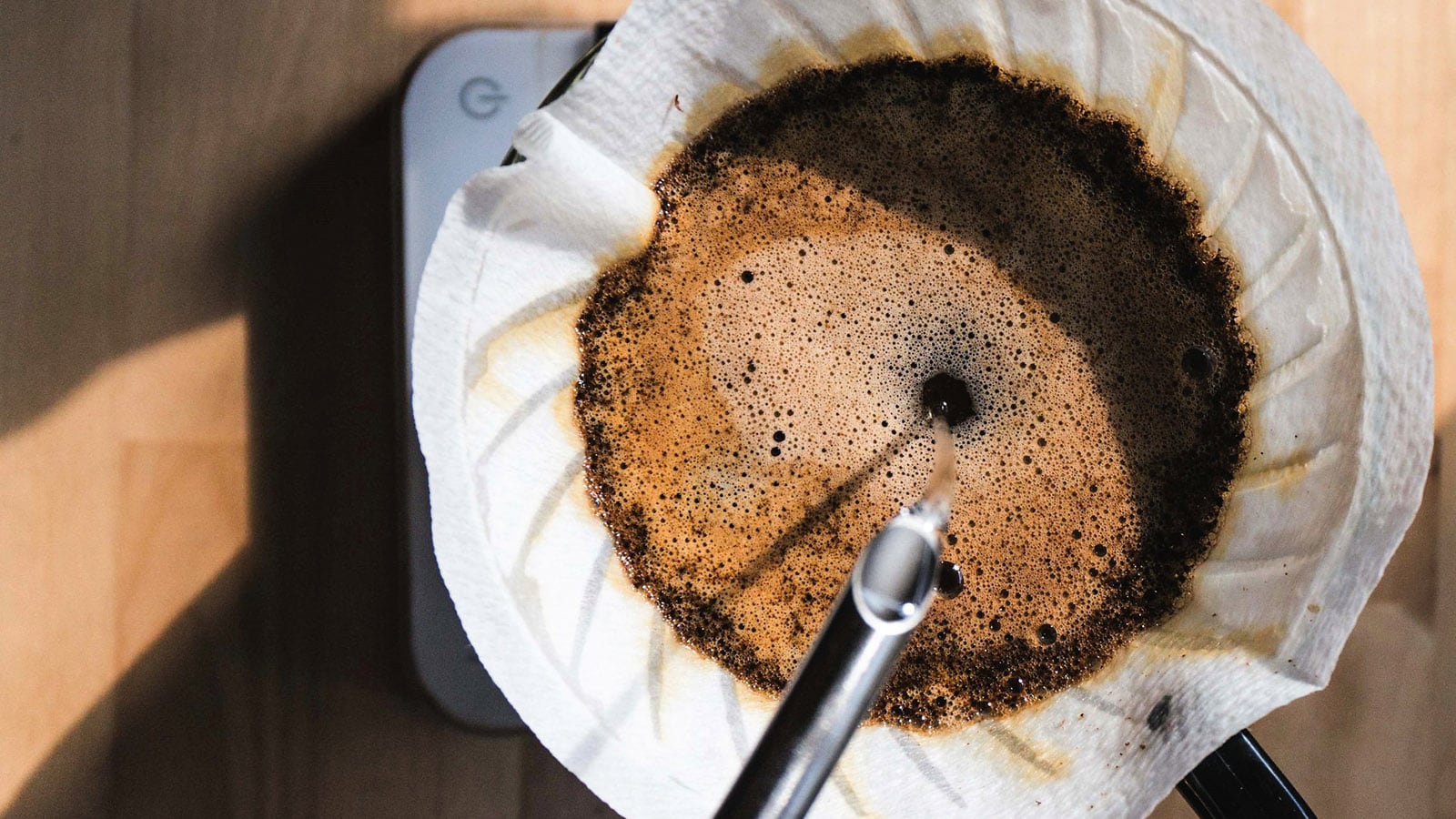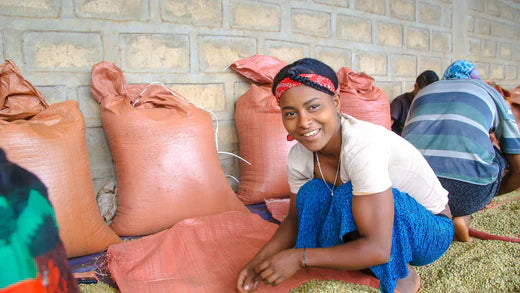Diving Deeper into Decaffeinated Coffee: How Compounds in Coffee Contribute to its Potential Health Benefits

To follow up on my previous article on decaffeinated coffee, I want to bring you deeper into the current state of the research on the health benefits of coffee. Exploring how bioactive compounds (like those in coffee) in the human body interact together to produce the health benefits is one of the most fascinating topics of research out there today. I am here to tell you, we at Purity have done our homework on this topic and have been overwhelmed by the convincing scientific evidence that supports the idea that both regular and decaf coffee have amazing potential to contribute to keeping us healthy.
There are perhaps hundreds of complex bioactive compounds in coffee, which interact together, change during roasting, and impact our bodies eventually. Besides caffeine, coffee contains trigonelline, diterpenes such as cafestol and kahweol, polyphenols including chlorogenic acids, caffeic acid, which can be formed by the degradation of chlorogenic acids, as well as other free-oxygen reducing compounds, and minerals such as magnesium(1). Coffee (regular or decaf) is a significant dietary contributor of some of these important compounds. A typical cup of coffee contains around 50-150 mg/100 ml chlorogenic acid(2) and coffee is considered the major source of chlorogenic acids in the diet(3). Choosing organic decaf coffee ensures that you’re getting these compounds without unnecessary additives.
As we go in-depth into the scientific literature, it is important to keep in mind that despite the strength of topic-specific studies, some of the best evidence we have that drinking any type of coffee is beneficial to health are the long-term epidemiological studies which examine overall longevity and all-cause mortality(4,5). Again and again, studies are finding that drinking coffee, including decaf, is associated with reduced risk of all-cause mortality. Put simply: People who drink coffee tend to live longer, and options like balance coffee highlight how mindful formulations can support both wellness and enjoyment. There is a real power in epidemiology – truth in life, that scientists are discovering.
Now, let’s dive into the current research on how coffee impacts specific health outcomes – irrespective of caffeine.
Type 2 Diabetes
Type 2 diabetes is the most common form of diabetes, caused by a combination of inadequate production of insulin and an inability of the body to respond fully to insulin. Most scientific studies that have investigated the impact of drinking coffee on Type II diabetes point to coffee drinkers having lower risk of developing the disease. In fact, epidemiological studies suggest that drinking more coffee (3-4 cups of per day) is associated with an approximate 25% lower risk of developing type 2 Diabetes, compared to consuming none or less than 2 cups per day(7,8). This is great news! A large-scale systematic review on this literature lead by the Harvard School of Public Health concluded that habitual coffee consumption is associated with a substantially lower risk of type 2 diabetes(9).
 To the point of this article, there is also good evidence of similar preventive effects with decaffeinated coffee(1,10,11,12). This effect may be partially explained by chlorogenic acids, trigonelline, or even magnesium (the exact mechanism has yet to be confirmed<13>). Chlorogenic acids have been demonstrated to inhibit glucose absorption(14,15). A randomized crossover trial study conducted in 2009 found that chlorogenic acid and trigonelline ingestion significantly reduced glucose and insulin after 15 minutes(16). A meta-analysis conducted in 2014 found a dose-dependent relationship, where the risk for type 2 diabetes decreased 11% for every 2 cups of coffee/day consumed(17). One study with very strong results reported that for those who drank 3–4 cups of decaffeinated coffee containing high contents of chlorogenic acids, the risk of type 2 diabetes was reduced by 30% (7). A review published in 2016 confirmed the mounting evidence that coffee drinkers who consume 3-4 cups per day exhibit a reduced risk of developing type 2 diabetes(18). The authors of this study attributed this to possibly both the caffeine and chlorogenic acids.
To the point of this article, there is also good evidence of similar preventive effects with decaffeinated coffee(1,10,11,12). This effect may be partially explained by chlorogenic acids, trigonelline, or even magnesium (the exact mechanism has yet to be confirmed<13>). Chlorogenic acids have been demonstrated to inhibit glucose absorption(14,15). A randomized crossover trial study conducted in 2009 found that chlorogenic acid and trigonelline ingestion significantly reduced glucose and insulin after 15 minutes(16). A meta-analysis conducted in 2014 found a dose-dependent relationship, where the risk for type 2 diabetes decreased 11% for every 2 cups of coffee/day consumed(17). One study with very strong results reported that for those who drank 3–4 cups of decaffeinated coffee containing high contents of chlorogenic acids, the risk of type 2 diabetes was reduced by 30% (7). A review published in 2016 confirmed the mounting evidence that coffee drinkers who consume 3-4 cups per day exhibit a reduced risk of developing type 2 diabetes(18). The authors of this study attributed this to possibly both the caffeine and chlorogenic acids.
Supporting this theory are various animal-based studies, which have confirmed an anti-diabetic insulin function strengthening impact of chlorogenic acids(13). The sheer number of studies and strength of reviews on this disease has led the link between coffee consumption and decreased risk of diabetes to be one of the strongest evidences to support coffees effect on the body. In addition, it is clear that chlorogenic acids are one of the primary drivers for this protective effect, so drinking coffee and decaf rich in those compounds is a great choice.
Liver Health
There are a host of serious liver diseases which can be positively impacted by drinking coffee. Please see my previous long post on the impact of coffee on the liver.
The prevalence of nonalcoholic fatty liver disease has been increasing over the past 30 years in tandem with increasing rates of diabetes, obesity, and metabolic disorders, and is a large public health issue around worldwide. Long-term ingestion of large amounts of alcohol is the most common cause of liver cirrhosis in developed countries. Also, liver cancer (hepatocellular carcinoma) is common worldwide and is widely accepted to be linked to other liver diseases.
The association between coffee consumption and a decreased risk of liver disease was established over 25 years ago(19). Since then, a large body of scientific work has elucidated an inverse association between moderate coffee consumption and the risk of developing a range of liver diseases including cancer, fibrosis and cirrhosis. The good news is, these effects have not been found to be exclusively linked to caffeine, which means decaf drinkers can likely enjoy these benefits as well. 
For example, an animal study on decaffeinated espresso found that it was able to reduce liver steatosis and inflammation and fibrosis in rats fed a high fat diet for 12 weeks. This was the first time that a study had showed caffeine was not essential for the anti-fibrotic effects of coffee and that components other than caffeine contribute to the hepatoprotective effect(20). Later, two studies on rats independently reported that both regular and decaffeinated coffee reduce liver fibrosis(21,22). Research by Ma and others assessed both the preventive and therapeutic effects of chlorogenic acids on mice fed a high fat diet and showed that these compounds blocked the development of fatty liver and the chlorogenic acid treatment reversed the high-fat-diet-induced hepatic steatosis(23). This supports the evidence that decaffeinated coffee would still give us the important liver-health related benefits of drinking coffee.
Colorectal Cancer
There is solid evidence that drinking decaf coffee can also contribute to a protective effect against colorectal cancer. There are an estimated 3.5 million individuals living with colorectal cancer worldwide, and physicians no specific dietary or lifestyle recommendations for patients with cancer owing to a lack of convincing evidence to support many of them(23,24). It is the third most common incident cancer in the world and the fourth leading cause of cancer-related death, colorectal cancer is a major public health challenge(24). Now, multiple studies have pointed to an important association between drinking decaf or regular coffee with a decreased risk of colorectal cancer(25,26,27).

A very large and important epidemiological study was published this year by Harvard School of Public Health, which collected data from the Nurses’ Health Study (1984–2012) and Health Professionals Follow-up Study (1986–2012), that followed 1599 patients diagnosed with stage 1, 2, or 3 colorectal cancer. They found that intake of caffeinated and decaffeinated coffee (2+ cups a day) was associated with lower risk of colorectal cancer-specific mortality and all-cause mortality(28). Specifically, they found that patients who consumed at least 4 cups of coffee per day had a 52% lower risk of CRC-specific death and 30% reduced risk of all-cause death. Meaning, patients who maintained a high level of coffee consumption both before and after diagnosis had particularly favorable survival. This inverse association between coffee and colorectal cancer risk has been hypothesized to be due to a number of factors not including caffeine, such as the anticarcinogenic properties of chlorogenic acids(29), coffee diterpenes(24,30), and other physical and biological actions in the gut with which coffee is involved.
Conclusions
It is clear that all types of coffee, including decaffeinated coffee, have been shown repeatedly to be involved in the protective effects against type 2 diabetes, liver damage, liver disease, liver cancer, and colorectal cancer. Additionally, we know that drinking organic, toxin-free, specialty coffee like Purity is the simplest way you can drink the best tasting, healthiest coffee possible. Overall, we have covered enough evidence here to convince me that drinking more healthy, pure, decaffeinated coffee can be a good way enhance my lifestyle and long-term well-being. It’s late in the evening, but am off to go brew up a cup of Purity decaf and rest easy knowing my clean, Swiss Water® decaf may be protecting my health.

References:
- <1> Natella, F., & Scaccini, C. (2012). Role of coffee in modulation of diabetes risk. Nutrition Reviews, 70(4), 207-217.
- <2> Farah, A. (2018). Chapter, ”Nutritional and health effects of coffee”, taken from: Lashermes, P. (ed.), Achieving sustainable cultivation of coffee, Burleigh Dodds Science Publishing, Cambridge, UK, 2018 (ISBN: 978 1 78676 152 1; www.bdspublishing.com).
- <3> Clifford, M. N. (2000). Chlorogenic acids and other cinnamates – nature, occurrence, dietary burden, absorption and metabolism. Journal of the Science of Food and Agriculture, 80(7), 1033-1043.
- <4> Park, S.-Y., Freedman, N. D., Haiman, C. A., Le Marchand, L., Wilkens, L. R., & Setiawan, V. W. (2017). Association of Coffee Consumption with Total and Cause-Specific Mortality Among Nonwhite Populations. Annals of Internal Medicine.
- <5> Freedman, N. D., Park, Y., Abnet, C. C., Hollenbeck, A. R., & Sinha, R. (2012). Association of Coffee Drinking with Total and Cause-Specific Mortality. New England Journal of Medicine, 366(20), 1891-1904.
- <6> Huxley, R., Lee, C. M., Barzi, F., Timmermeister, L., Czernichow, S., Perkovic, V., Grobbee, D. E., Batty, D., & Woodward, M. (2009). Coffee, decaffeinated coffee, and tea consumption in relation to incident type 2 diabetes mellitus: a systematic review with meta-analysis. Arch Intern Med, 169(22), 2053-2063.
- <7> van Dam, R. M., & Feskens, E. J. M. (2002). Coffee consumption and risk of type 2 diabetes mellitus. The Lancet, 360(9344), 1477-1478.
- <8> van Dam, R. M., & Hu, F. B. (2005). Coffee consumption and risk of type 2 diabetes: a systematic review. Jama, 294(1), 97-104.
- <9> Greenberg, J. A., Boozer, C. N., & Geliebter, A. (2006). Coffee, diabetes, and weight control. The American Journal of Clinical Nutrition, 84(4), 682-693.
- <10> Salazar-Martinez, E., Willett, W. C., Ascherio, A., Manson, J. E., Leitzmann, M. F., Stampfer, M. J., & Hu, F. B. (2004). Coffee consumption and risk for type 2 diabetes mellitus. Annals of Internal Medicine, 140(1), 1-8.
- <11> Wu, T., Willett, W. C., Hankinson, S. E., & Giovannucci, E. (2005). Caffeinated coffee, decaffeinated coffee, and caffeine in relation to plasma C-peptide levels, a marker of insulin secretion, in U.S. women. Diabetes Care, 28(6), 1390-1396.
- <12> Tajik, N., Tajik, M., Mack, I., & Enck, P. (2017). The potential effects of chlorogenic acid, the main phenolic components in coffee, on health: a comprehensive review of the literature. (7), 2215.
- <13> Clifford, M. N. (2000). Chlorogenic acids and other cinnamates – nature, occurrence, dietary burden, absorption and metabolism. Journal of the Science of Food and Agriculture, 80(7), 1033-1043.
- <14> Higdon, J. V., & Frei, B. (2006). Coffee and Health: A Review of Recent Human Research. Critical Reviews in Food Science and Nutrition, 46(2), 101-123.
- <15> van Dijk, A. E., Olthof, M. R., Meeuse, J. C., Seebus, E., Heine, R. J., & van Dam, R. M. (2009). Acute Effects of Decaffeinated Coffee and the Major Coffee Components Chlorogenic Acid and Trigonelline on Glucose Tolerance. Diabetes Care, 32(6), 1023.
- <16> Jiang, X., Zhang, D., & Jiang, W. (2014). Coffee and caffeine intake and incidence of type 2 diabetes mellitus: a meta-analysis of prospective studies. European Journal of Nutrition, 53(1), 25-38.
- <17> Santos, R., & Lima, D. (2016). Coffee consumption, obesity and type 2 diabetes: a mini-review. European Journal of Nutrition, 55(4), 1345-1358.
- <18> Klatsky, A., & Armstrong, M. (1992). Alcohol, smoking, coffee, and cirrhosis. Am J Epidemiol, 136, 1248-1257.
- <19> Vitaglione, P., Morisco, F., Mazzone, G., Amoruso, D. C., Ribecco, M. T., Romano, A., Fogliano, V., Caporaso, N., & D’Argenio, G. (2010). Coffee reduces liver damage in a rat model of steatohepatitis: The underlying mechanisms and the role of polyphenols and melanoidins. Hepatology, 52, 1652-1661.
- <20> Furtado, K. S., Prado, M. G., Aguiar, E. S. M. A., Dias, M. C., Rivelli, D. P., Rodrigues, M. A., & Barbisan, L. F. (2012). Coffee and caffeine protect against liver injury induced by thioacetamide in male wistar rats. Basic Clin. Pharmacol. Toxicol., 111, 339-347.
- <21> Arauz, J., Moreno, M. G., Cortes-Reynosa, P., Salazar, E. P., & Muriel, P. (2013). Coffee attenuates fibrosis by decreasing the expression of TGF-and CTGF in a murine model of liver damage. . J. Appl. Toxicol., 33, 970-979.
- <22> Ma, Y., Gao, M., & Liu, D. (2015). Chlorogenic acid improves high fat diet-induced hepatic steatosis and insulin resistance in mice. . Pharm. Res., 32, 1200-1209.
- <23> Cross, A. J., & Gunter, M. J. (2018). Coffee and Colorectal Cancer: Grounds for Prevention? Gastroenterology, 154(4), 790-792.
- <24> Ferlay J, Soerjomataram I, Dikshit R, et al. (2015). Cancer incidence and mortality worldwide: sources, methods and major patterns in GLOBOCAN 2012. Int J Cancer 136: E359–E386.
- <25> Rashmi Sinha, A. J. C., Carrie R Daniel, Barry I Graubard, Jennifer W Wu, Albert R Hollenbeck, Marc J Gunter,, & Yikyung Park, a. N. D. F. (2012). Caffeinated and decaffeinated coffee and tea intakes and risk of colorectal cancer in a large prospective study. Am J Clin Nutr, 96, 374–381.
- <26> Galeone, C., Turati, F., La Vecchia, C., & Tavani, A. (2010). Coffee consumption and risk of colorectal cancer: a meta-analysis of case–control studies. Cancer Causes and Control, 21(11), 1949-1959.
- <27> Michels, K. B., Willett, W. C., Fuchs, C. S., & Giovannucci, E. (2005). Coffee, Tea, and Caffeine Consumption and Incidence of Colon and Rectal Cancer. Journal of the National Cancer Institute,, 97(4), 282-292.
- <28> Hu, Y., Ding, M., Yuan, C., Wu, K., Smith-Warner, S. A., Hu, F. B., Chan, A. T., Meyerhardt, J. A., Ogino, S., Fuchs, C. S.,
- <29> Araújo, J. R., Gonçalves, P., & Martel, F. (2011). Chemopreventive effect of dietary polyphenols in colorectal cancer cell lines. Nutrition Research, 31(2), 77-87.
- <30> Cavin C, H. D., Scharf G, Constable A, Huber WW, Schilter B. (2002). Cafestol and kahweol, two coffee specific diterpenes with anticarcinogenic activity. Food Chem Toxicol, 40, 1155-1163.








Leave a comment